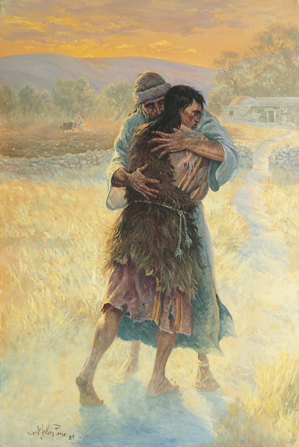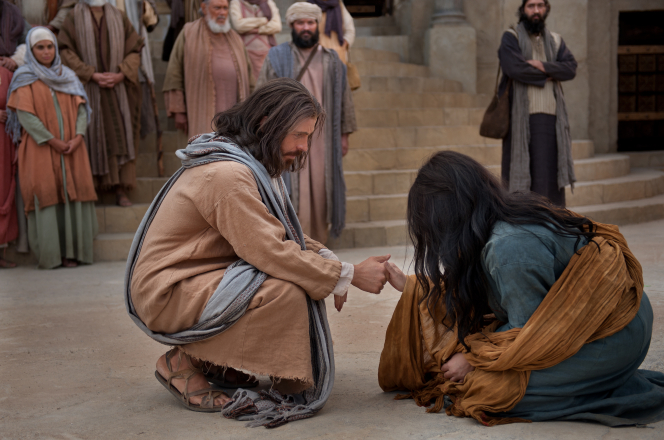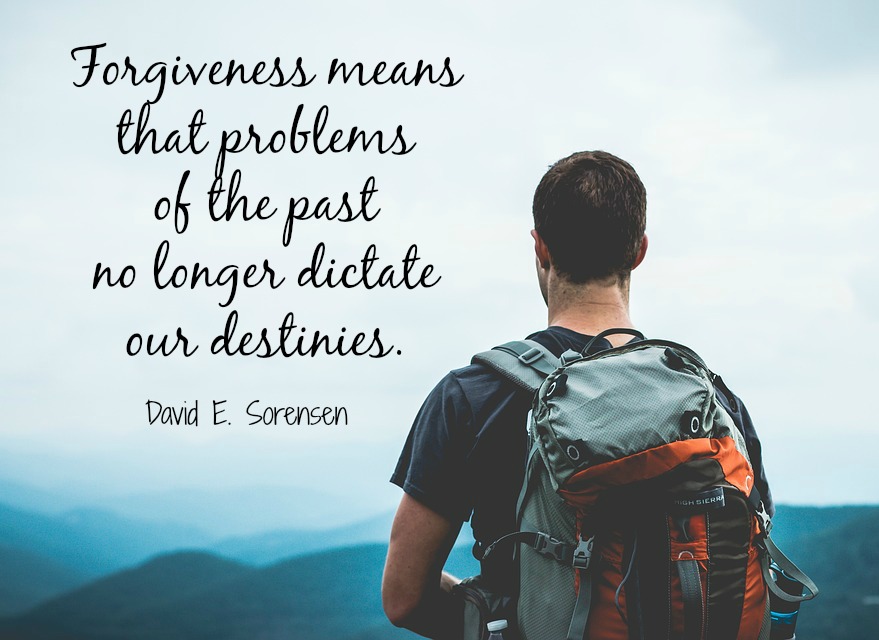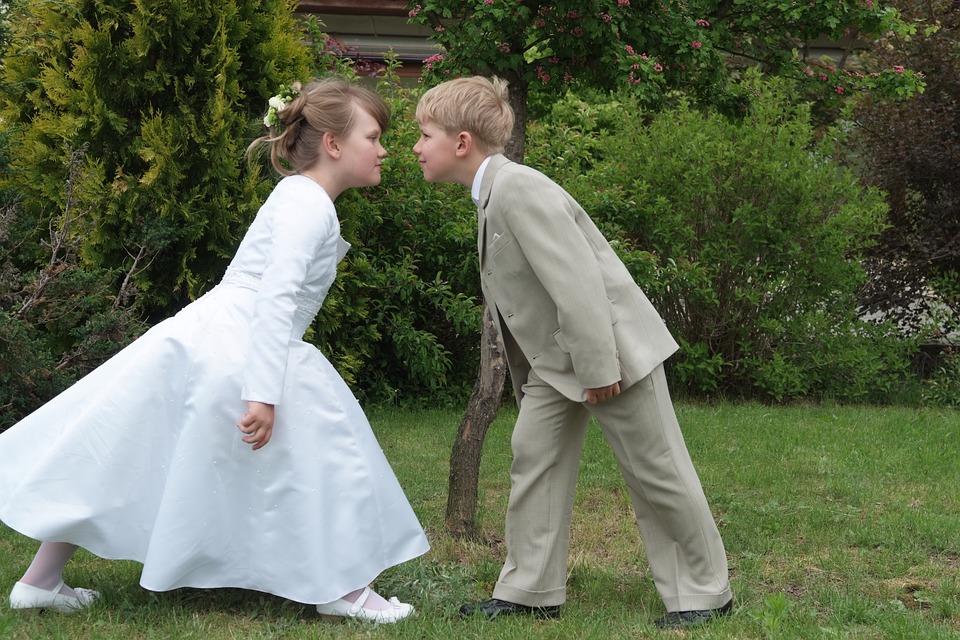Forgiveness is one of the most divine teachings of the Savior, Jesus Christ. It is, perhaps, an often overlooked virtue in the world today. But it is an important principle taught in The Church of Jesus Christ of Latter-day Saints. President Gordon B. Hinckley taught,
A spirit of forgiveness and an attitude of love and compassion toward those who may have wronged us is of the very essence of the gospel of Jesus Christ. Each of us has need of this spirit. The whole world has need of it. The Lord taught it. He exemplified it as none other has exemplified it.
We all want—and desperately need—forgiveness in our own lives. But do we extend it as freely as we should to others? I like to think of myself as pretty forgiving, but a situation arose recently that has me pondering how far-reaching forgiveness for others really is (and needs to be). In this instance, I felt that the actions of another person were putting me in the middle of an uncomfortable, no-win situation. And I have been upset at the heartache caused by these choices. I have struggled to overcome these feelings of frustrations and find peace as I navigate this delicate issue. But as I spoke with my husband about it, I realized that forgiveness is the answer and that the attributes of the Savior—unconditional love, compassion, mercy and not judging—help us in our quest to truly forgive.
Forgiveness and the Savior
The Lord has made it very clear that we must forgive others. It is a commandment. The scriptures teach:
I, the Lord, will forgive whom I will forgive, but of you it is required to forgive all men. (Doctrine & Covenants 64:10)
And also:
But if ye do not forgive, neither will your Father which is in heaven forgive your trespasses. (Mark 11:26)
And in Luke, the Savior explains the reason that we are commanded to forgive others:
Judge not, and ye shall not be judged: condemn not, and ye shall not be condemned: forgive, and ye shall be forgiven. (Luke 6:37)
President Dieter F. Uchtdorf taught,
The doctrine is clear. We all depend on the Savior; none of us can be saved without Him. Christ’s Atonement is infinite and eternal. Forgiveness for our sins comes with conditions. We must repent, and we must be willing to forgive others.
I realized as I was talking with my husband that not only was I not forgiving others, I was also judging them. Of the Savior’s teachings, President Uchtdorf said:
Of course, these words seem perfectly reasonable—when applied to someone else. We can so clearly and easily see the harmful results that come when others judge and hold grudges. And we certainly don’t like it when people judge us.
But when it comes to our own prejudices and grievances, we too often justify our anger as righteous and our judgment as reliable and only appropriate. Though we cannot look into another’s heart, we assume that we know a bad motive or even a bad person when we see one. We make exceptions when it comes to our own bitterness because we feel that, in our case, we have all the information we need to hold someone else in contempt.
In this case, I was guilty of doing just that. I was judging this other person based on my limited knowledge of the situation. Just as forgiving is a commandment, the refusal to do so is a sin. President Uchtdorf said,
The Apostle Paul, in his letter to the Romans, said that those who pass judgment on others are “inexcusable.” The moment we judge someone else, he explained, we condemn ourselves, for none is without sin. Refusing to forgive is a grievous sin—one the Savior warned against.
The Savior did not only give us the commandment to forgive, He also set the ultimate example for us. Elder Marion D. Hanks taught:
Christ’s love was so pure that he gave his life for us: “Greater love hath no man than this, that a man lay down his life for his friends.” (John 15:13.) But there was another gift he bestowed while he was on the cross, a gift that further measured the magnitude of his great love: he forgave, and asked his Father to forgive, those who persecuted and crucified him.
Was this act of forgiveness less difficult than sacrificing his mortal life? Was it less a test of his love? I do not know the answer. But I have felt that the ultimate form of love for God and men is forgiveness.
Forgiveness is Found through Love
 Not only is forgiveness the ultimate form of love for God and men, it is found through it. President Uchtdorf said,
Not only is forgiveness the ultimate form of love for God and men, it is found through it. President Uchtdorf said,
Forgiving ourselves and others is not easy. In fact, for most of us it requires a major change in our attitude and way of thinking—even a change of heart. But there is good news. This “mighty change” of heart is exactly what the gospel of Jesus Christ is designed to bring into our lives.
How is it done? Through the love of God.
When our hearts are filled with the love of God, something good and pure happens to us. … The more we allow the love of God to govern our minds and emotions—the more we allow our love for our Heavenly Father to swell within our hearts—the easier it is to love others with the pure love of Christ. As we open our hearts to the glowing dawn of the love of God, the darkness and cold of animosity and envy will eventually fade.
As the love of Christ fills our hearts, we begin to see others differently. President Uchtdorf said:
The pure love of Christ can remove the scales of resentment and wrath from our eyes, allowing us to see others the way our Heavenly Father sees us: as flawed and imperfect mortals who have potential and worth far beyond our capacity to imagine. Because God loves us so much, we too must love and forgive each other.
Seeing others as the Savior does means seeing the burdens that others carry, and then trying to ease them. One man said that the people with whom he works have lived through some horrific experiences, and rather than judge them for their choices we should be in awe of the strength it took them to survive. This is true of so many people. We don’t always know their struggles or hardships. But we don’t need to add to them, either. As President Uchtdorf said,
… There is enough heartache and sorrow in this life without our adding to it through our own stubbornness, bitterness, and resentment.
We are not perfect.
The people around us are not perfect. People do things that annoy, disappoint, and anger. In this mortal life it will always be that way.
Nevertheless, we must let go of our grievances. Part of the purpose of mortality is to learn how to let go of such things. That is the Lord’s way.
Remember, heaven is filled with those who have this in common: They are forgiven. And they forgive.
Forgiveness is not always easy, but it is possible. President Uchtdorf taught:
Lay your burden at the Savior’s feet. Let go of judgment. Allow Christ’s Atonement to change and heal your heart. Love one another. Forgive one another.
Forgiveness Means Letting Go
 Harboring a grudge against an enemy is easy to do, but it takes its toll. President Hinckley said:
Harboring a grudge against an enemy is easy to do, but it takes its toll. President Hinckley said:
How difficult it is for any of us to forgive those who have injured us. We are all prone to brood on the evil done us. That brooding becomes as a gnawing and destructive canker. Is there a virtue more in need of application in our time than the virtue of forgiving and forgetting? There are those who would look upon this as a sign of weakness. Is it? I submit that it takes neither strength nor intelligence to brood in anger over wrongs suffered, to go through life with a spirit of vindictiveness, to dissipate one’s abilities in planning retribution. There is no peace in the nursing of a grudge. There is no happiness in living for the day when you can “get even.”
Paul speaks of “the weak and beggarly elements” of our lives. (See Galatians 4:9.) Is there anything more weak or beggarly than the disposition to wear out one’s life in an unending round of bitter thoughts and scheming gestures toward those who may have affronted us?
Forgiving others is very freeing because it means letting go of grudges and hurt that weigh us down. I had an experience many years ago where I felt that I received an answer to a prayer, but then the result was contrary to what I thought was going to happen. I was really upset about the whole thing, and I poured out my heart to God, asking why this had happened. As I was driving down the freeway, my answer came very definitively in the form of a billboard, which read: LET IT GO. This is the same counsel that prophets, apostles and even the Savior have for us when it comes to forgiving others. But, as with most things, it’s easy to say and harder to do. Elder David E. Sorensen said:
This is not to say that forgiveness is easy. When someone has hurt us or those we care about, that pain can almost be overwhelming. It can feel as if the pain or the injustice is the most important thing in the world and that we have no choice but to seek vengeance. But Christ, the Prince of Peace, teaches us a better way. It can be very difficult to forgive someone the harm they’ve done us, but when we do, we open ourselves up to a better future. No longer does someone else’s wrongdoing control our course. When we forgive others, it frees us to choose how we will live our own lives. Forgiveness means that problems of the past no longer dictate our destinies, and we can focus on the future with God’s love in our hearts.
Forgiving others allows us to remove the albatross from around our necks and swim to the safety of the Savior’s love. If we don’t, we will allow ourselves to drown in the sea of bitterness, weighed down by the grudges we carry. When we forgive, we free up our own energy so that it can be used in more meaningful pursuits.
The Healing Power of Forgiveness
Forgiveness opens the door to healing and peace. One of the most amazing examples of this, besides the Savior, is the story of how one Amish community found forgiveness in the face of tragedy. An armed man who was not Amish but was familiar with the community stormed into an Amish schoolhouse, letting the boys go and keeping the girls inside. He tied them up and opened fire, killing five and wounding five. Then he turned the gun on himself. President James E. Faust continued:
This shocking violence caused great anguish among the Amish but no anger. There was hurt but no hate. Their forgiveness was immediate. Collectively they began to reach out to the milkman’s suffering family. As the milkman’s family gathered in his home the day after the shootings, an Amish neighbor came over, wrapped his arms around the father of the dead gunman, and said, “We will forgive you.” Amish leaders visited the milkman’s wife and children to extend their sympathy, their forgiveness, their help, and their love. About half of the mourners at the milkman’s funeral were Amish. In turn, the Amish invited the milkman’s family to attend the funeral services of the girls who had been killed. A remarkable peace settled on the Amish as their faith sustained them during this crisis.
One local resident very eloquently summed up the aftermath of this tragedy when he said, “We were all speaking the same language, and not just English, but a language of caring, a language of community, [and] a language of service. And, yes, a language of forgiveness.”
Although this incident occurred nearly a decade ago, I am still inspired by the power of this story. The compassion, love and forgiveness that the Amish community extended to the family of this gunman helped everyone to begin healing from this tragedy. And it left me feeling that if they could forgive the unforgivable, then I needed those in my life whose wrongs were petty in comparison. This is the healing power of forgiveness. President Faust said:
If we can find forgiveness in our hearts for those who have caused us hurt and injury, we will rise to a higher level of self-esteem and well-being. Some recent studies show that people who are taught to forgive become “less angry, more hopeful, less depressed, less anxious and less stressed,” which leads to greater physical well-being. Another of these studies concludes “that forgiveness … is a liberating gift [that] people can give to themselves.”
Forgiveness Doesn’t Make a Wrong OK
Forgiving others doesn’t make a wrong OK and is not a justification of sin. We are commanded to forgive, but sometimes there are still penalties for the wrongdoer. Elder Sorensen said:
I would like to make it clear that forgiveness of sins should not be confused with tolerating evil. In fact, in the Joseph Smith Translation, the Lord said, “Judge righteous judgment.” The Savior asks us to forsake and combat evil in all its forms, and although we must forgive a neighbor who injures us, we should still work constructively to prevent that injury from being repeated. A woman who is abused should not seek revenge, but neither should she feel that she cannot take steps to prevent further abuse. A businessperson treated unfairly in a transaction should not hate the person who was dishonest but could take appropriate steps to remedy the wrong. Forgiveness does not require us to accept or tolerate evil. It does not require us to ignore the wrong that we see in the world around us or in our own lives. But as we fight against sin, we must not allow hatred or anger to control our thoughts or actions.
This is the trap that can be so difficult to navigate. Hatred and anger are the easiest emotions because then we don’t have to deal with the real pain and hurt lurking behind. But hatred and anger are the most destructive because they block our ability to heal. President Faust said:
Of course … mercy cannot rob justice. Bishop [Christopher] Williams addressed this concept so well when he said, “Forgiveness is a source of power. But it does not relieve us of consequences.” When tragedy strikes, we should not respond by seeking personal revenge but rather let justice take its course and then let go. It is not easy to let go and empty our hearts of festering resentment. The Savior has offered to all of us a precious peace through His Atonement, but this can come only as we are willing to cast out negative feelings of anger, spite, or revenge. For all of us who forgive “those who trespass against us,” even those who have committed serious crimes, the Atonement brings a measure of peace and comfort.
Sometimes complete forgiveness requires us to welcome back one who has wronged us. But sometimes it doesn’t. Some people, companies, etc. are toxic in our lives and must continue to be avoided for our own spiritual, financial/or and physical safety. A friend of mine shared with me this powerful story:
I had made a trip to Cyprus (the Greek island in the Mediterranean) ten years after finishing a job tour there. A sister in our branch approached me and thanked me for making it possible for her to go to the temple to take out her endowments and make higher covenants with the Lord. I wondered what I had done. I didn’t remember doing such a great service.
It turned out that during our years on the island she had asked me about forgiveness. There was someone who had injured her and she was trying to forgive him, but she just couldn’t bring herself to let him back into her life. I told her that forgiving someone does not necessary mean you need to bring that person back into full fellowship. Some people are dangerous and always will be, and you should, after letting go of your anger and grudges, stay as far away from that person as possible.
This was a great relief for her. She had misunderstood this fact about forgiveness. She now realized she had already done her part and was free to move ahead spiritually.
As we turn to the Lord for guidance, He can help us determine which actions we should—or should not— take as we seek to move on and forgive others.
Forgiveness and Families
Perhaps nowhere is forgiveness more important than in our family relationships. Growing up, my mom would always tell us, “Your friends will come and go, but your siblings will be your friends forever.” I now tell this to my kids, with the added phrase, “You won’t be friends later if you don’t learn how to be friends now.” Forgiveness in families is so important because these are the relationships that mean the most to us and thus have the ability to cause the most hurt. It is for this reason that we must take care in our family relationships. Elder Sorensen said:
In much of today’s popular culture, the virtues of forgiveness and kindness are belittled, while ridicule, anger, and harsh criticism are encouraged. If we are not careful, we can fall prey to these habits within our own homes and families and soon find ourselves criticizing our spouse, our children, our extended family members. Let us not hurt the ones we love the most by selfish criticism! In our families, small arguments and petty criticisms, if allowed to go unchecked, can poison relationships and escalate into estrangements, even abuse and divorce. Instead, just like we learned with the poisonous venom, we must “make full haste” to reduce arguments, eliminate ridicule, do away with criticism, and remove resentment and anger. We cannot afford to let such dangerous passions ruminate—not even one day.
I have realized that rather than passing judgment and holding grudges against someone else, I need to take stock of what I’m teaching my children at home and how I treat my husband and children. President Thomas S. Monson said:
… Some of our greatest opportunities to demonstrate our love will be within the walls of our own homes. Love should be the very heart of family life, and yet sometimes it is not. There can be too much impatience, too much arguing, too many fights, too many tears. Lamented President Gordon B. Hinckley: “Why is it that the [ones] we love [most] become so frequently the targets of our harsh words? Why is it that [we] sometimes speak as if with daggers that cut to the quick?” The answers to these questions may be different for each of us, and yet the bottom line is that the reasons do not matter. If we would keep the commandment to love one another, we must treat each other with kindness and respect. …
Forgiveness should go hand in hand with love. In our families, as well as with our friends, there can be hurt feelings and disagreements. Again, it doesn’t really matter how small the issue was. It cannot and should not be left to canker, to fester, and ultimately to destroy. Blame keeps wounds open. Only forgiveness heals.
Forgiveness allows us to find healing, happiness and peace in all the situations in our lives—and with all the people in our lives. It is through the love of God that we will find it.








This was refreshing to read after all the comments that I’ve heard about the Mormon church and their teachings about unforgiveness, judgements, resentments and the shunnings of even their own family members!